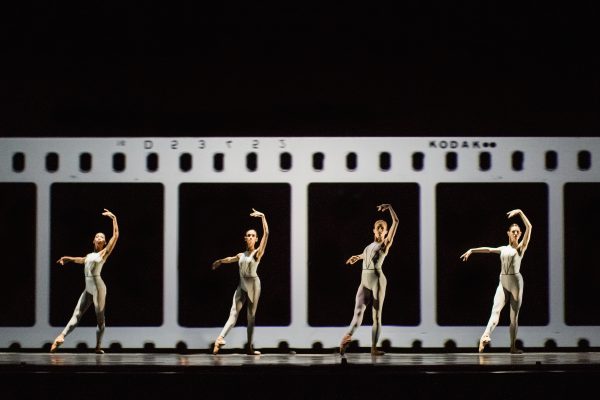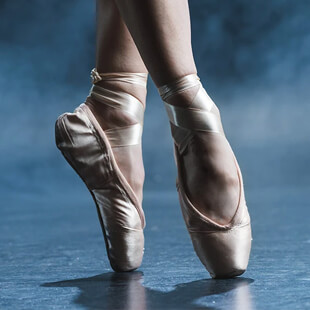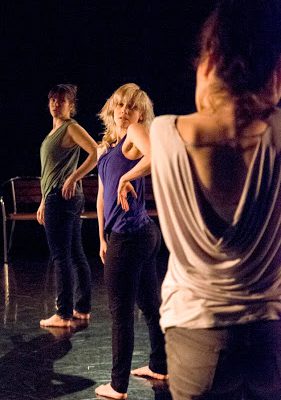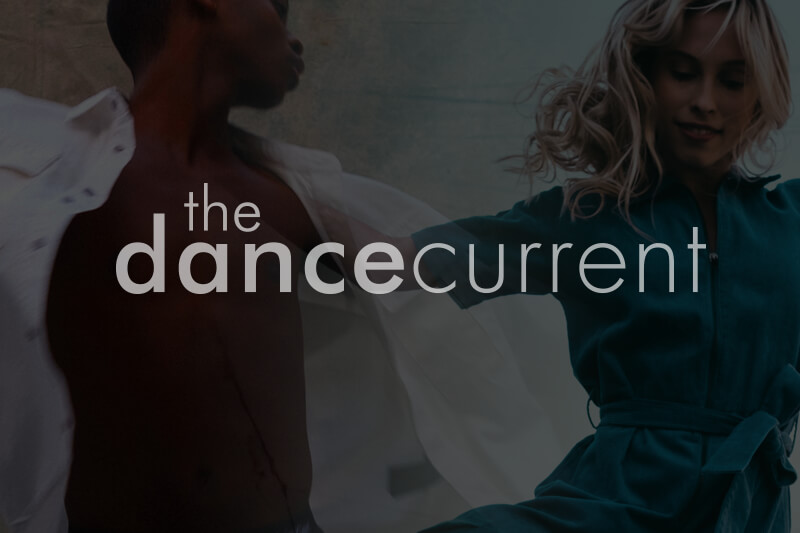Fringe festival-going can be a distinctly hit-or-miss experience. It was my great surprise to happen upon Co. Venture, a beauty of a show produced and developed by the fledgling Brooklyn Touring Outfit in its world premiere at the Montréal Fringe Festival held in mid-June. Founder Pepper Fajans, a dancer and carpenter, created this wonderful performance of dance and object theatre, in collaboration with renowned Merce Cunningham archivist David Vaughan. The piece, performed by the duo, is about their friendship. Over the course of forty-five minutes we witness an unexpected kinship, get inklings of what draws people closer, and finally a reminder of what it feels like to be alive and how friendship is created and nourished. What emerges in the show is something to be appreciated and enjoyed.
A free-flowing conversation with Fajans and ninety-one-year-old Vaughan, prior to a post-show dinner at Montréal’s famed Express restaurant, uncovers their special bond. The pair first met when Fajans was hired by the Merce Cunningham Dance Company (MCDC) to do carpentry, building sets for Monday’s with Merce, an online video program featuring weekly episodes of Cunningham’s Monday class, as well as extra storage in the production office for the large collection of instruments used in the scores played during Cunningham’s dances. This was early spring 2008, over a year before Cunningham’s death. Then, when Cunningham’s personal assistant abruptly moved on to other things, the twenty-three-year-old Fajans was, serendipitously, asked to take over the position for what turned out to be the final year of the great man’s life. The position required Fajans to be sensitive and attentive to his needs, provide Cunningham with physical support and also modify the choreographer’s home and studio so he could more easily move around. Only problem was that Fajans, as he describes it, “didn’t care for old people.” This feeling stemmed from his experience with his grandparents’ alcoholism; but this was different, this was Merce Cunningham, he knew he “needed to say yes.”
The gregarious Seattle-born Fajans has energy to burn. He comes from a vaudeville family, was a child performer, sold origami on the street, busked, did magic tricks, and studied dance at Sarah Lawrence College in Bronxville, N.Y., though never had dreams of dancing in a company. In the end, Fajans and Centralia, Wash.-born Cunningham, had interests to share: a love for the outdoors, dance, and a couple of traits that Pacific Northwesterners seem to share — both were trustworthy and charitable people. Fajans quickly took to pushing Cunningham’s wheelchair and lifting him into the chair. He realized, “This is my maturation. I shed any disgust I had.” He focused his energies on Cunningham and devotedly describes him as “gentle and efficient and someone who chose his words carefully… I was appreciative of what he was observing. He was a kind individual, and an individual.
Born in London, David Vaughan first met Cunningham while studying dance at the School of American Ballet in New York in the mid-1950s. When Cunningham opened his studio on 14th Street, Vaughan was asked to be the studio secretary. “He liked having me around,” he says. He travelled on the company’s first world tour in 1964, and was formally named the company archivist in 1976. Five years younger than Cunningham, the two had a marvelous rapport, he shares.
After Cunningham’s death in July 2009, MCDC embarked on a farewell Legacy Tour the following year. The production came to Montréal’s Festival TransAmériques as well as fifty other cities over two years. “To places we’d been to and not,” says Vaughan, adding with a smile that, with him in tow, “there was another old man to be pushed around.” Vaughan needed help at airports and to his hotel room, and Fajans was hired for those specific tasks. Thus set in motion their friendship. In Rome, Vaughan wanted to see two art exhibitions, and Fajans not only took him, but also took him around to other sites. Says Vaughan about Fajans, “I didn’t know him well yet, but I felt that he was extraordinary, impressive.” They started to dine together, at Fajans’ suggestion. “I was very touched by that,” says Vaughan. Fajans says those excursions “became a treasure hunt. I was touring with a folding bike, and I’d scope out [the city].” What developed was a deep friendship, something that eclipsed any generational difference. “Over dinner, Pepper told me he wanted to buy a building.” The building he had in mind in the South Bronx would eventually become the home for the Brooklyn Touring Outfit, a space for dancers, musicians, puppeteers and designers to create collaborative performance. Protection of Cunningham’s lineage is very important to both of them and the technique devised by Cunningham is taught in the space.
After the Legacy Tour concluded, the two continued to meet, hanging out at Vaughan’s flat in the city. Fajans created a loft space in Vaughan’s second floor walk-up in the East Village, which he called home for a period. “It was good for me to live with someone,” says Vaughan. “We have this rapport. How amazing to have found each other.”
Fajans attended last year’s Montréal Fringe with another group and knew he’d be back with his own work. “I wanted to show up with something [organizers] hadn’t seen.” He enlisted Vaughan, who has a history on- and off-Broadway, to be in the show. Vaughan took a cue from his old friend. “Merce always said yes,” he says, adding, “I’ve always trusted Pepper.” The two started working on the piece. They took an old poster from Cunningham’s 1975 work Rebus, in which the dancer-choreographer features prominently. Designer Maiko Kikuchi then created a collage of dance imagery, including almost cartoon-like enlargements of Cunningham’s foot and hand, and she filmed the duo’s reactive conversations. Thus developed the bones for the show.
On stage, Fajans and performer/prop manipulator Joey Wolfslau (who never remains on stage) move objects around Vaughan, who nearly gets bonked by large dangerous-looking pieces of plywood and poles. “Manipulating these [materials] gets the audience worried.” It’s true, watching this elderly man in near collision with these objects pulls us in out of concern. The opening monologue is 10 Imaginary Dances, written by founding Cunningham company dancer, the late author-illustrator Remy Charlip. Vaughan gives an expertly dry delivery of Charlip’s sublime and irreverent, sometimes fantastical series of choreographic instructions for would-be performances, which he has performed in various venues over the years. The imaginary dance Sardines goes like this: “Eight boys and girls undress and get into a bathtub. They arrange themselves comfortably. The choreographer pours warm olive oil over them. Curtain.” The text also contains a cheeky apology that, due to lack of funding, they can’t be performed. In effect, 10 Imaginary Dances is a beautiful encapsulation of the John Cage-Cunningham collaboration, as Vaughan points out, that dance can exist in the imagination.
In the performance, Vaughan and Fajans trade off in dialogue that sometimes sounds scripted, other times improvisational. Interestingly, Cunningham never allowed for improvisation. “He said someone might get hurt,” says Vaughan. What’s magical are the stories of Merce, the duo’s travels with the Cunningham company, the snippets of dance in which Cunningham vocabulary comes alive — the body in torsion, a casual, but always-ready quality in the movement, the notion of rest between the beats of movement, and the sense that movement is a metaphor for life. And, of course, their cross-age friendship is front and centre.
Co. Venture won the 2015 Frankie Award for Outstanding Choreography at this year’s Fringe festival. As such, Brooklyn Touring Outfit will remount the work in Montréal in January 2016, and as with all winners of this prize will be presented by the Centaur Theatre for its Wildside Festival. As for Fajans and Vaughan, they continue to get together often, meeting for dinner every Sunday, trading off who cooks.
Tagged: Choreography, Performance, Physical Theatre, Montréal , QC





